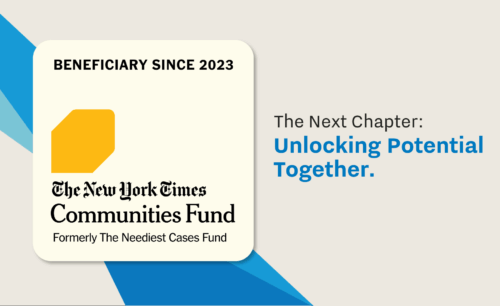
How To Get A Job In Tech: Resume & Interview Tips
How To Get A Job In Tech: Resume & Interview Tips
As Per Scholas continues to prepare our learners for thriving tech careers, our training does not simply stop at the technical skills needed to acquire a tech role. In fact, 20% of our training focuses entirely on communication, collaboration, continuous learning, giving and receiving feedback, and career navigation skills critical to landing that first job or moving up the high-growth tech ladder post-graduation.
Within our training programs, we set aside an entire day each week to focus solely on professional development and career coaching for all of our learners, providing a holistic approach to starting a career in tech. Our professional development days often include resume reviews, mock interviews, and career coaching sessions with our excellent Career Coaches. We picked the brain of our Senior Manager of Career Solutions, Christel Grissett, to find out her top resume and interview tips on putting your best foot forward as you embark on your career in the tech industry.
Tips for writing an entry-level tech resume
Your resume should be concise, direct, and impactful. Typically, resumes should not be much longer than one page in length. It is likely that the hiring manager recruiting for your position will be looking at several resumes, so make yours stand out at a glance by highlighting only your most recent and relevant experiences. Include the most directly applicable at the top of your resume. Don’t be afraid to get creative if you don’t have employment experience that is directly related to the position you are applying for; classes, group projects, and even seemingly unrelated past jobs can all provide you with valuable and widely-applicable skills.
Your resume is a live document
When it comes to creating your resume, keep in mind that you will want to tailor it specifically to each job that you apply for. Different roles require different skills, experiences, and expertise, so highlight applicable skills related to the particular role you are applying for. Another tip is to use keywords that appear in the job description throughout the document. “Creating a resume is not a ‘one and done’ deal,” Grissett warned. “Updating your resume for each job using the job description will help your resume come up within application tracking systems, so it does not become lost in the mix.”
Spell check your resume
Maintain a clean, legible, and professional font throughout your resume document. Create curb appeal by listing your skills and a summary of your accomplishments at the beginning of your resume. Grissett recommends against using premade resume templates because they are often flagged in applicant tracking systems. Save your resume as a PDF to send to the company and name it as your name and the position title so it will be easily found by both you and the company.
Include your soft skills
Soft skills, such as time management, leadership, and interpersonal skills, are all transferable across any job industry. Many of our Per Scholas graduates are looking to make career changes in a new job sector, and soft skills learned in previous roles are always useful and can be appealing on a resume. Be sure to include your soft skills to show the skills and experiences you have that could be applicable to any market.

Preparing for an entry-level tech interview
Research the company
Besides just researching the company, check out who will interview you on LinkedIn. Review what they post, like, and share – this could spark conversation and reduce any nerves you are experiencing since you will know who you are interviewing with beforehand.
Practice common questions & attend mock interviews before the interview
Practice makes perfect, but you don’t want to sound too rehearsed! One of the advantages of our training at Per Scholas is that our professional development days often include mock interviews – an opportunity to practice interviewing and become familiar with this part of the hiring process.
You can help yourself prepare for an upcoming interview by researching and brainstorming your own answers to some of the most commonly-asked interview questions. Common questions include “tell me a bit about yourself,” “what are some of your greatest strengths and weaknesses?” and “where do you see yourself in five years?” Having an idea of what to expect and what you will say beforehand can help you feel more relaxed, prepared, and confident going into the interview and can ensure that you give more satisfactory well-thought-out responses.
Give yourself a background check
Background check yourself! Whatever you see when you search yourself online or on social media will be what the recruiters see as well. A good recruiter will check your presence on social media to evaluate what you are projecting there and ensure that your online image aligns with company values. While job searching, take some time to make sure that the content of your social media accounts is something you would be comfortable with a potential future employer seeing.
If presented and leveraged correctly, your social media profiles can even be a powerful tool to elevate your application by demonstrating relevant experiences, interests, and values.
Consider this a conversation more than an interview
To help settle your nerves, consider the interview more of a conversation. “This is an opportunity to get to know who you could work for and if the company is right for you as well,” mentioned Grissett. Grissett also recommended leaving the interviewer with a question that prompts you to reveal more about yourself, such as, “is there anything I can disclose or speak to that shows my fit for this position?”
Ask questions and learn something new
Make sure to ask your interviewer plenty of questions. This can not only promote dialogue and help you and the interviewer get to know each other better, but it also demonstrates your interest in the position and helps you learn more about what can be expected from the position itself.
At some point during almost every interview, the interviewer will ask you if you have any questions. It is wise to prepare a list of questions before going into the interview. The questions may be answered naturally throughout the course of the interview, or you may bring them up when prompted, but asking questions about the position is an excellent way to show the interviewer that you are interested in and curious about the job, the organization, and its employees.
Asking thoughtful questions can also show the interviewer that you have done your research on the organization, but make sure you have actually done your research – don’t ask questions that could be easily answered by a quick online search!
Most importantly, asking questions is the best way to inform your own decision about whether or not you actually want to work in that particular position. Remember, while the interviewer will be evaluating you to determine whether or not you are a good fit for the position and company, you are also evaluating the position and company to determine if they are a good fit for you. The interview is a great opportunity to learn about the company, workplace culture, and the specifics of the role you will be taking on.
Some examples of good questions to help make an impression as well as learn about the responsibilities of the role you are applying for include:
- What does a typical day/week look like in this position?
- What are some skills and experiences that would be most helpful for someone in this position to have?
- What are some of the biggest challenges in this position?
- What are the growth opportunities for this position?
- What do you like about working at this company?
- What are the current goals that the company is focused on, and how does this team work to support hitting those goals?
- What is the workplace culture like at this company?
Regardless of whether you are selected for the position you are applying for, each interview can be viewed as an opportunity to learn something new about the company, workforce, and industry you are looking to join.
If you keep these interview and resume tips in mind, we know that you will be set up for success as you embark on your career in technology. A great resume and strong interviewing skills can get you far in the job application process! Many of these tips are reviewed in greater depth during our cost-free training as part of the professional development curriculum with our career and business development coaches, who dedicate one day a week of classes to career development training. To learn more about our upcoming training, visit our website.
Sign up for our Monthly Impact Report
More News

Donate Now
Your support makes a powerful difference in our ability to build a technology talent training solution that creates greater access and equity.

